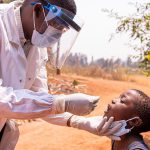Following the train derailment in East Palestine, Ohio, on Feb. 3, residents of the surrounding communities have questions about their health. Health experts from the University of Pittsburgh Schools of the Health Sciences have been following the situation and are in contact with community members. Their answers to some of the most frequently asked questions are provided below and will be updated as more information becomes available.
Is it safe to drink city and/or well water?
By law, city water must be regularly tested. This allows officials to quickly identify a problem, and alert residents to stop drinking unsafe water. For well water, on the other hand, there is no law that requires regular testing. Therefore, especially because of the spill, it is very important to continue or start testing all drinking water. For concerns about water quality, contact your local health department or department of environmental protection.
Is it safe to shower in tap water? Well water?
At room temperature, vinyl chloride in water can evaporate and travel back into the air. If you think that your water may be contaminated, maximizing natural airflow can help limit exposure.
Should office buildings and homes be keeping their windows shut?
Vinyl chloride will break down quickly outdoors. Indoors, vinyl chloride can be present in air and in water. Indoor air and water testing, including drinking water, is important to detect and stop exposure. Natural airflow (opening a window) and proper ventilation can help limit exposure indoors.
Will masks and carbon filters help keep us safe from exposure?
N95 masks, HEPA filters and carbon filters will not protect you against vinyl chloride exposure.
What odors would indicate vinyl chloride in our area?
Vinyl chloride has a mild, sweet odor that you will smell at very high levels shortly after it makes its way into the air, such as immediately after a spill. Other chemicals present at the spill have a similar odor.
What other chemicals of concern were spilled?
The Environmental Protection Agency (EPA) has confirmed that vinyl chloride, isobutylene, butyl acrylate, benzene, ethylhexyl acrylate and ethylene glycol monobutyl ether were all being transported by the train that derailed.
How can vinyl chloride affect my health? When should I contact a doctor?
Acute exposure to high levels of vinyl chloride can irritate the throat and nose, make you feel like your skin is burning, make you cough and give you trouble breathing.
Exposure to vinyl chloride over a long time can damage the liver and, in some cases, cause a specific kind of liver cancer. It is important to contact your doctor if you do not feel well and visit with your doctor or other health professional regularly to check on your health.
There have been fish kills and reports of pets and other animals dying. What does this mean for the health of people who live near the spill?
Animals exposed to chemicals such as vinyl chloride may have different health effects than humans exposed to the same chemicals, and some chemicals can have worse effects on animals, often resulting in death. The fish kill is an example of these negative effects.
What are the public health actions needed to address the long-term consequences of the spill?
Since the health of the environment is directly linked to that of people, there are several important public health actions we can take:
• Continue to monitor how much vinyl chloride is still in the environment. Test the air, surfaces, drinking water and homes of people who live close to the spill and in areas where vinyl chloride and other chemicals traveled to after the spill.
• Regularly check what is happening to the health of people who may be affected by the spill. First, address any health concerns that exist now. Next, find out how a person’s health might be affected going forward. This type of public health action can be done by focusing on a specific health concern, such as liver disease. By checking on both what is in the air, water and soil, while also looking at what is happening with the health of the people who live near the spill, we can take actions as soon as possible to limit or stop the exposure and protect their health.
• If the health concern or disease may take a very long time to develop, such as a specific cancer, then people’s health must be checked for a long time through a disease registry. This type of public health action can continue for many years.
Disasters can cause physical harm and result in high stress for concerned residents. Addressing this stress is often as important as addressing the concerns we can see or feel physically.
Should we worry about the “rainbow” sheen we see in the creeks nearby? Is the water safe to touch?
Chemicals from the spill went into nearby creeks. Officials are conducting tests to find out what type of chemicals are in the water, how much of those chemicals were spilled and where the chemicals are traveling to in the region. Until we know these answers, it is best not to come in contact with these bodies of water.
Should the people of Pittsburgh be worried?
To date, there is no indication that people living in Pittsburgh will come in contact with vinyl chloride from the spill. Vinyl chloride and the other chemicals spilled are called “volatile organic compounds.” These chemicals break down relatively quickly when in the air and, given the distance from the spill, Pittsburgh is unlikely to find vinyl chloride from the spill in the air here.
How far downstream do people need to be concerned about drinking water?
More testing of creeks, private wells and drinking water is needed to determine who is at risk of exposure to vinyl chloride from the spill. Since private wells are not regularly tested, it is important to monitor these wells to protect the residents who use them for drinking and showering.
Do we need to worry about rain downwind of East Palestine?
The more time passes since the spill, the less likely it is that the rain downwind from the spill can harm the environment or pose a significant risk to people.
Reporters with questions for University of Pittsburgh Schools of the Health Sciences experts can contact mediarelations@upmc.edu.








